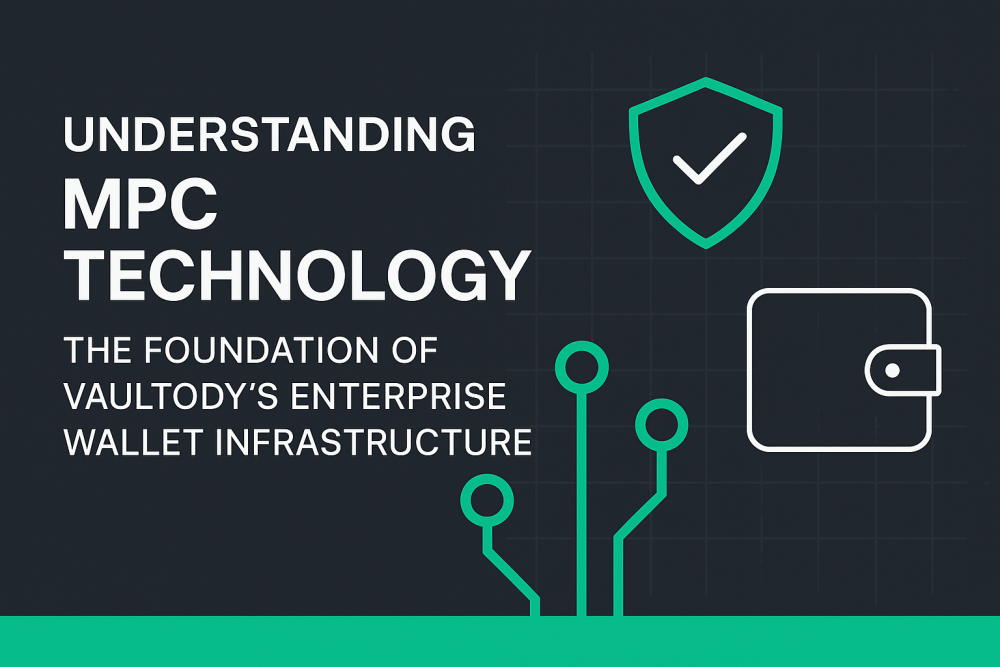Businesses operating digital assets today require secure, reliable, and scalable wallet infrastructure. Traditional private-key systems are no longer sufficient for enterprises managing high-value transactions, multiple teams, or large user bases.
This is where MPC Core, Vaultody’s in-house developed multi-party computation engine, becomes essential.
MPC Core is the cryptographic foundation behind Vaultody’s entire platform. It distributes signing power, removes single points of failure, and introduces a governance model where no transaction can be executed by a single person, device, or system. Instead, MPC Core allows multiple authorized parties to participate in the signing process, ensuring that every transfer, approval, or sensitive action follows predefined enterprise rules and requires the correct combination of participants before it can be completed.
Through this multi-party approval structure, MPC Core becomes the mechanism that enables governance, translating organizational policies into enforced cryptographic requirements. Whether it is Treasury Management, Direct Custody, Wallet-as-a-Service, or upcoming tokenization and stablecoin solutions, MPC Core ensures that transactions only proceed when all required parties contribute their key shares according to the enterprise's team members, limits, and permissions.
What Is MPC Core?
MPC Core is Vaultody’s proprietary multi-party computation engine. It replaces the idea of a single private key with a distributed key architecture that uses multiple encrypted shares to sign transactions.
Instead of storing a private key in one place, MPC Core ensures:
- No private key is ever created as a whole
- No system stores or sees all private key material
- Multiple independent key shares participate in transaction authorization
- Cryptographic thresholds enforce enterprise governance policies
- Compromise of a single share does not compromise assets
MPC Core turns wallet security into a collaborative, governed process rather than a single point of risk.
How MPC Core Works
1. Distributed Key Generation
MPC Core does not generate one private key. Instead, key shares are created independently across secure nodes. These shares (also known as shards) collectively produce a public key, while the private key never exists in any complete form.
This means there is no master key to steal, lose, or expose.
2. Threshold Signing
When a transaction is initiated, MPC Core triggers a signing session. Multiple entities use their key shards to generate partial signatures. Only when the required threshold is met (such as 3-of-3 or 3-of-5) does MPC Core produce a valid signature.
No share alone can sign anything.
No single device or administrator can exceed policy rules.
3. Distributed Execution Across Vaults and Accounts
Within Vaultody 2.0, each vault has its own independent MPC configuration. Treasury teams, exchanges, or fintech platforms can set their own:
- Approval policies
- Spending rules
- Risk thresholds
- Roles and permissions
- Escalation flows
MPC Core enforces these rules at the signing level, providing real security, not just UI-level checks.
Why MPC Core Is Superior to Legacy Approaches
MPC vs. Private Key Wallets
Traditional wallets depend on a single private key stored in one location.
If exposed, everything is compromised.
MPC Core removes that risk entirely.
MPC vs. Hardware Wallets
Hardware wallets isolate private keys inside a physical device, but enterprises often require:
- High transaction throughput
- Automated workflows
- Multiple team approvals
- API-based operations
- Multi-region operations
Hardware alone cannot deliver this.
MPC Core can.
MPC vs. Multisig
Multisig depends on on-chain signature logic, which:
- Is visible to the public
- Costs more in fees
- Is limited to chains that support multisig
- Is difficult to modify once deployed
MPC Core works off-chain, supporting any blockchain, with flexible signer changes and no exposure of internal policies.
Where MPC Core Operates Inside Vaultody 2.0
MPC Core is not a single feature.
It is the foundation of the entire Vaultody platform.
Treasury Management Solution
The Treasury Management solution is designed for businesses and enterprises that want to retain full control of their digital assets and operate as their own custodian:
- Vault-based MPC signing
- Governance policies
- Role-based approvals
- Mobile co-signing
- Multi-chain visibility
- Fully self-custodial
MPC Core enforces every approval path and transaction rule.
Direct Custody Solution
For exchanges, payment providers, neobanks, and fintech platforms that manage digital assets on behalf of their customers. It is designed for businesses that need secure, segregated accounts and high-volume, API-driven operations:
- Segregated accounts per customer
- Automated MPC co-signer node
- Dynamic thresholds
- Escalation for high-value or unusual transactions
- API-first operations
MPC Core ensures high throughput without compromising security.
Wallet-as-a-Service (WaaS)
For platforms that offer end-user wallets and want to provide true self-custody without building cryptographic infrastructure themselves. Ideal for consumer apps, Web3 platforms, gaming ecosystems, and digital asset services that need fast, scalable wallet deployment:
- One vault per user
- Distributed key shares
- Full user custody
- Developer SDKs and APIs
- Instant wallet creation
- Mobile-ready governance flows
MPC Core guarantees that neither Vaultody nor our client platform can access the end-user funds.
Scaling MPC Core Across Future Vaultody Solutions
Vaultody’s upcoming platforms are also powered by MPC Core:
Tokenization Platform
MPC-secured issuance, governance, and lifecycle management of tokenized assets.
Permissions, minting rights, and supply controls are all enforced through MPC Core.
Stablecoin Operations Platform
MPC-secured settlement flows for SaaS providers, payment processors, and global merchants.
Every treasury operation, approval chain, and compliance rule is enforced by MPC Core.
This unified MPC architecture ensures consistent security and operational governance across all Vaultody products.
Why Enterprises Choose MPC Core
Companies rely on Vaultody’s MPC Core because it delivers:
- High-assurance cryptography
- In-house development and optimization
- No dependency on third-party MPC providers
- Flexible governance and approval frameworks
- High performance under enterprise load
- Seamless multi-chain integration
- Unlimited vault and account scaling
- Full self-custody across all solutions
MPC Core is not just the technology inside Vaultody.
It is the commitment to security, control, and operational integrity for every enterprise customer.
Conclusion: MPC Core as the Heart of Enterprise Digital Asset Infrastructure
Secure digital asset operations demand more than a wallet.
They require an infrastructure that can scale, withstand attacks, adapt to governance policies, and integrate into enterprise systems.
This is why Vaultody developed MPC Core in-house.
It powers every signing action, reinforces every vault, protects every account and governs every workflow across Vaultody 2.0 and upcoming solutions.
For enterprises moving digital assets at scale, MPC Core provides the trust, transparency and security that modern digital asset infrastructure requires.









 Copy link
Copy link